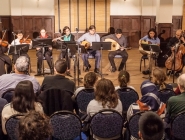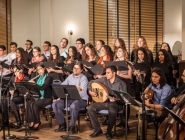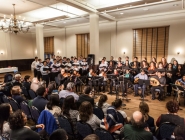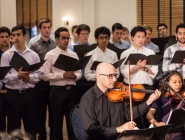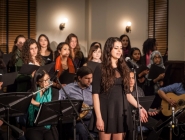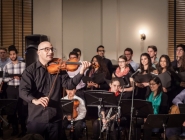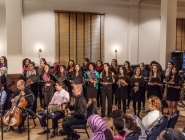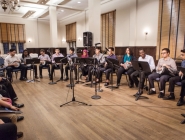The Spring 2015 semester of the Arab Music Ensemble Class at University of Pennsylvania ended on a high note with a performance at Houston Hall on April 23, featuring choir, instrumentalists, and percussionists led by Music Director Hanna Khoury on violin, Kinan Abou-afach on cello, and Hafez Kotain on percussion.
Photos by Chip Colson

One of the choir members, ARIEL KOREN – Class President 2015, took the time to reflect and interview a few other Penn students in the choir about their experience in the class. Here is Ariel’s blog…
Penn’s Arabic Music Ensemble class has been a beautiful source of stress relief for Penn students from all different walks of life.
Denzel Cummings, who is the former Co-chair of UMOJA and the founder of the Black Ivy Coalition, said of his experience in the Arabic Music Ensemble class: “It is always a pleasure to come to class. Given the high-stress and high-intensity nature of my Penn life, the opportunity to wind down and just sing while immersing myself in a new culture is essential”.
Denzel is unique, but his experience of Arabic Music Ensemble is not. It seems that some of the busiest students, leaders, activists, and artists from different walks of life on Penn’s campus share a common sentiment: Arabic Music Ensemble class is a special space that facilitates a unique opportunity for artistic catharsis and cultural and linguistic immersion.
Jelani Hayes, a public speaking coach and graduating senior, most certainly has her hands full. But being the busy senior she is makes her Arabic Music Ensemble class experience extra special. “I really enjoy this class. It is a fun break from my usually hectic school days. I’ve learned a lot about Arab music culture in this class and about classical and folk traditions from several different Middle Eastern countries.” Hayes, who took Arabic classes for a few years at Penn, greatly appreciates that the class provides a window into Arabic language and culture. “I love hearing some of the words and structures that I studied in class come up in song. It is special.”
In keeping with Hayes’s experience of linguistic reinforcement provided by melody and song, Susanna Zaraysky, the multilingual author of the blog “Making Languages Resonate” which is about the indispensable role that music can play in a foreign language classroom, argues that using music to learn languages should be mandatory. Songs help people remember new words and grammar structures like no other teaching technique possibly can.
Taylor Blackston, another Penn senior who is a member of the New Spirit of Penn Gospel Choir and an avid singer, confirms this through her own experiences in the class: “As a singer myself, nothing makes foreign language learning resonate more with me than singing does”. Although Taylor doesn’t study Arabic in a formal capacity, you can often hear her singing the words of “Asfoor” and “Il helwadi” as she strolls down Locust Walk. Clearly, the class has impacted her. “I can never get those songs out of my head! After class, I keep singing the words for at least a couple of hours.” As an activist who sits on the board of Penn’s Abuse and Sexual Assault Prevention team, having a song stuck in her head comes in handy; “it’s great to have a cheerful melody to fall back to after a long day of heavy and difficult work,” she says.
Katherine Mateo, another senior, agrees. When Mateo isn’t mentoring underclassmen constituents of the Latin@ Coalition or directing her nonprofit organization Global Youth United, you can find her in the library working on her thesis which addresses affirmative action policies and racial justice in higher education. But Katherine isn’t all about the books; “it’s important to take the time to wind down sometimes. It’s great that my schedule isn’t only poli sci classes and that I get to spend an hour every Thursday singing along with my classmates. It affords me a necessary lightness. It’s challenging, but in a way that’s different from how my political science classes are challenging. It’s challenging in a kind of put-yourself-out-there-and-leap-out-of-your-comfort-zone kind of way”.
This notion resonates similarly with Stephanie Jideama, who is a senior at Penn and is the founder of the Penn Initiative for Minority Mental Health. In her leadership capacity, she spends so much time caring for others that it can be hard sometimes to take time to care for herself. But every Thursday, from 6-7 PM, she gets that time. And it makes a difference. Friends notice an intense and determined look on her face as she seeks to master the pronunciation, the tone, and the rhythm of each song. “Throwing myself into this activity has been both challenging and rewarding,” she confirms. Given that she didn’t know any Arabic prior to the class, it has been an exercise not only in performance but also in language. Soaking in the melodies of the songs allows her to find peace amidst the business of her Penn life, and this peace helps her approach the process of learning words in Arabic with a clearer mind.
Clearly, the class has been enlightening, cathartic, and inspiring. But will the class continue to impact the lives of the students it has touched once the semester has ended? Indeed, it will.
Mateo, who speaks several romance languages, has decided to take Arabic classes when she is in graduate school. “I was pretty sure I wanted to learn Arabic as my next language – but now, I am definitely sure.”
Kerena Thomas, a graduating senior who has been accepted into the Teach for America corps to serve as a teacher for students with special needs is already applying her Arabic Music Ensemble class experience to her curriculum plans. “I will definitely be singing with my students next year when I’m a teacher at TFA. Through music, students can grow in a unique way.” She adds that studying foreign languages is crucial in our modern-day, rapidly globalizing world. “I want my students to have opportunities to learn about different languages and cultures”. In the context of the United States foreign language education deficit (85% of US students don’t step foot in a foreign language class until high school), Thomas’s desire to expose her students to linguistic diversity could not be more important.
Thomas adds, “I want to combine song with language education in my classroom next year. What better way is there to inspire my students to learn with their ears, their minds, and – above all – with their hearts?”
What Penn students enrolled in Arabic Music Ensemble class have done this semester is perhaps just that. They have opened their ears to a new language and new melodies, and they have opened their minds to a new culture. And in so doing, they have opened their hearts to a whole new world.
— by Ariel Koren, Class President 2015, University of Pennsylvania


